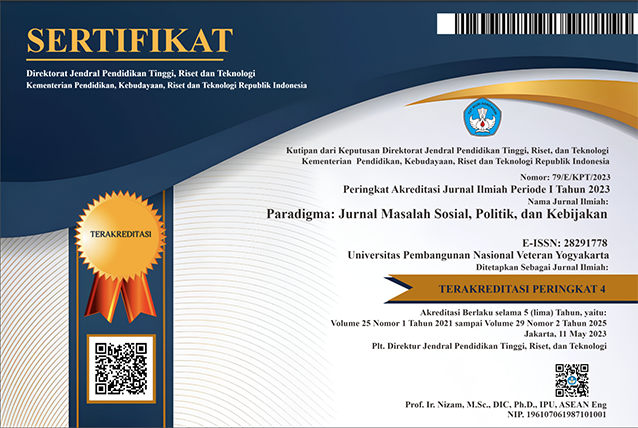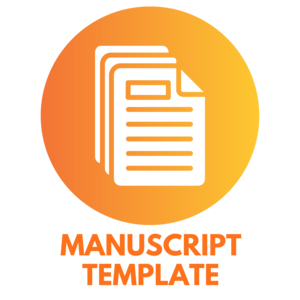Global Governance dan Bioteknologi: Monopoli Benih Transgenik oleh Monsanto dan Posisi World Trade Organization
DOI:
https://doi.org/10.31315/paradigma.v26i2.7331Abstract
World Trade Organization telah menetapkan Trade-Related Aspects of Intellectual Property Rights (TRIPs) Agreement sebagai mekanisme baru dalam pengaturan terkait hak kekayaan intelektual. Tetapi, penerapan TRIPs Agreement banyak menimbulkan kontroversi di bidang aglikultur. Masalah yang terjadi adalah hak paten jelas memberikan perlindungan yang kuat dan tidak berasalan bagi industri bioteknologi. Hal itu bisa dimanfaatkan oleh perusahaan besar dan juga negara-negara maju untuk memonopoli benih transgenik yang dampaknya akan merugikan para petani-petani lokal—khususnya di negara berkembang—yang berdampak pada ketahanan pangan global. Dengan mendasarkan Analisa pada pendekatan Global Governance, tulisan ini membahas mengenai bagaimana posisi Global Governance—dalam hal ini WTO—dalam penerapan TRIPs Agreement dengan mengambil studi kasus monopoli benih transgenic oleh Monsanto. Metode yang digunakan adalah metode kualitatif dengan mengumpulkan data-data sekunder. Tulisan ini berargumen bahwa WTO sebagai Global Governance masih belum bisa mengatasi masalah monopoli benih transgenik karena sampai saat ini pun pembahasan ini belum selesai di dalam internal WTO sendiri. Dalam pembuatan regulasinya, WTO kurang memperhatikan prinsip-prinsip dasarnya dalam melindungi dan memberi manfaat bagi negara-negara berkembang sehingga cenderung menguntungkan negara-negara maju atau perusahaan besar yang memiliki power.
Kata Kunci: TRIPs Agreement, benih transgenik, World Trade Organization, Global Governance, Monopoli, Monsanto
References
ActionAid. (2003). food rights Trade Related Intellectual Property Rights. Action Aid. https://www.yumpu.com/en/document/read/44384610/trade-related-intellectual-property-rights-trips-actionaid
Bieler, A., Higgott, R., & Underhill, G. (2011). Non-state actors and authority in the global system. Non-State Actors and Authority in the Global System, 1–301. https://doi.org/10.4324/9780203165041
Braga, C. A. P., Fink, C., & Sepulveda, C. P. (2000). Intellectual property rights and economic development. World Bank Discussion Papers, 32(412), 1–57.
Fink, C., & Maskus, K. E. (n.d.). Intellectual Property and development lessons from recent economic research.
Held, D., & McGrew, A. G. (n.d.). The global transformations reader: an introduction to the globalization debate. http://books.google.com/books?id=xYLdRrJSxW8C&pgis=1
Kingsbury, D. (2012). Globalization and Development” International Development: Issues and Challenges Second Edition.
Kleinman, D. L., & Kloppenburg, J. (1991). Aiming for the discursive high ground: Monsanto and the biotechnology controversy. Sociological Forum, 6(3), 427–447. https://doi.org/10.1007/BF01114471
Lamphere, J. A., & East, E. A. (2017). Monsanto’s Biotechnology Politics: Discourses of Legitimation. Environmental Communication, 11(1), 75–89. https://doi.org/10.1080/17524032.2016.1198823
Matsangou, E. (2017). The GMO debate: sowing the seeds of controversy | World Finance. https://www.worldfinance.com/markets/the-gmo-debate-sowing-the-seeds-of-controversy
Monsanto dropped a cool $2 million on lobbying in Q1 2009 | Grist. (n.d.). Retrieved July 8, 2022, from https://grist.org/article/2009-05-29-monsanto-lobby-2million/
Nataraj, A. B. and G. (2014). Indian food security and the WTO deal | East Asia Forum. Eastasiaforum. https://www.eastasiaforum.org/2014/01/25/indian-food-security-and-the-wto-deal/
Oke, E. K. (2020). Do Agricultural Companies that Own Intellectual Property Rights on Seeds and Plant Varieties have a Right-to-Food Responsibility? Science, Technology and Society, 25(1), 142–158. https://doi.org/10.1177/0971721819890043
Peschard, K., & Randeria, S. (2020). Taking Monsanto to court: legal activism around intellectual property in Brazil and India. Journal of Peasant Studies, 47(4), 792–819. https://doi.org/10.1080/03066150.2020.1753184
Shiva, V. (2017). The Seeds Of Suicide: How Monsanto Destroys Farming. Global Research. http://www.navdanya.org/
Trade Related Intellectual Property Rights (TRIPS) - ActionAid. (n.d.). Retrieved July 8, 2022, from https://www.yumpu.com/en/document/read/44384610/trade-related-intellectual-property-rights-trips-actionaid
WTO. (n.d.). TRIPS Agreement. Retrieved July 4, 2022, from https://www.wto.org/english/docs_e/legal_e/27-trips.pdf
WTO. (2002). ACCESSIONS: LEAST-DEVELOPED COUNTRIES, Director-General Supachai welcomes agreement streamlining LDC membership. https://www.wto.org/english/news_e/pres02_e/pr323_e.htm
WTO. (2015). World Trade Organization Understanding the WTO.
Downloads
Published
How to Cite
Issue
Section
License
The manuscript submitted to Paradigma: Jurnal Masalah Sosial, Politik, dan Kebijakan journals are released under the license of Creative Commons Attribution-Non Commercial- ShareAlike (CC BY SA) if and when the article is accepted for publication.
We declare that:
- This paper has not been published in the same form elsewhere.
- It will not be submitted anywhere else for publication prior to acceptance/rejection by this Journal.
- A copyright permission is obtained for materials published elsewhere and which require this permission for reproduction.
Retained Rights/Terms and Conditions
Authors retain all proprietary rights to the published works, such as (but not limited to) the following rights:
- Copyright and other proprietary rights relating to the article, such as patent rights,
- The right to use the substance of the article in own future works, including lectures and books,
- The right to reproduce the article for own purposes,
- The right to self-archive the article
The right to enter into separate, additional contractual arrangements for the non-exclusive distribution of the article's published version (e.g., post it to an institutional repository or publish it in a book), with an acknowledgment of its initial publication in this journal Paradigma: Jurnal Masalah Sosial, Politik, dan Kebijakan



